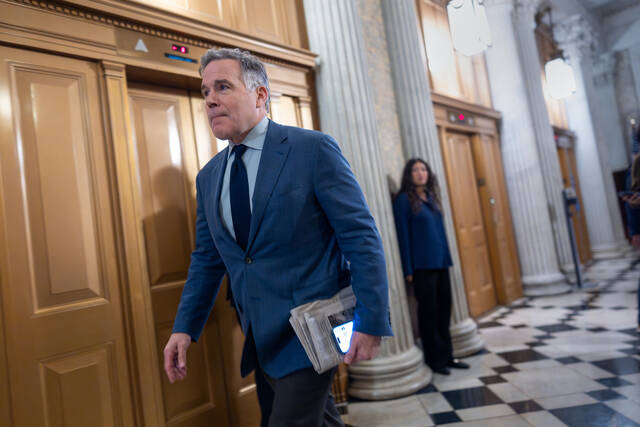A group of Pennsylvania lawmakers in the U.S. House and Senate have set their sights on regulating rail companies following last month’s train derailment in East Palestine, Ohio.
U.S. Sens. Bob Casey, D-Scranton, and John Fetterman, D-Braddock, have introduced the bipartisan Railway Safety Act of 2023, while U.S. Rep. Chris Deluzio, D-Aspinwall, has introduced the Decreasing Emergency Railroad Accident Instances Locally Act.
Both bills look to regulate the railway industry by creating new safety requirements for trains, increasing communication between rail companies and states, and requiring hazardous cargo to be properly classified.
A Norfolk Southern train carrying hazardous chemicals derailed near the Pennsylvania border on Feb. 3, causing a fire that burned for days. Norfolk Southern conducted a controlled burn of five tankers that had been hauling vinyl chloride to avoid a potential explosion, sending a dark plume of smoke over the East Palestine area.
Residents, including several in Beaver County, were ordered to evacuate for several days. No injuries were reported, and subsequent testing by state and federal agencies showed no adverse effects to the region’s water and air quality.
Still, people living in the East Palestine area have expressed concerns about the long-term impact of the hazardous chemicals that were released in the area and they have been critical of Norfolk Southern’s response to the derailment.
Casey said his legislation “will make freight rail safer, hold rail companies accountable for putting communities and workers in harm’s way, and protect people over profits.”
The bill was introduced by Casey and Fetterman, along with U.S. Sens. Sherrod Brown, D-Ohio, JD Vance, R-Ohio, Marco Rubio, R-Fla., and Josh Hawley, R-Mo.
The Senate bill would require rail carriers to provide advance notification to state emergency response teams about their cargo, increase railcar inspections and fines, allocate funding for future railway safety investments, reduce wheel bearing failures by increasing detections and require well-trained, two-person crews aboard every train.
The Norfolk Southern train had a three-person crew at the time of derailment (two workers and a trainee). Union contracts require that two workers be on freight trains, but there is no law on the books requiring a staffing minimum.
Deluzio told the Tribune-Review last month that the railways were arguing against a proposed rule to mandate two workers on trains.
An initial report from the National Transportation Safety Board showed that crew members had no prior warning the Norfolk Southern train was in trouble until an alarm sounded just before it went off the tracks. The crew then slowed and stopped the train and saw fire and smoke coming from it. Crews performed their job to standards, the report said.
The derailment was caused by a failed wheel bearing. The NTSB report showed the train was traveling under the 50 mph speed limit and a detection showed the failed wheel bearing increased its temperature by 215 degrees in a span of 30 miles, but that was under the temperature threshold established by Norfolk Southern.
Train derailments have dramatically decreased from highs in the 1980s. Currently, about 1,000 derailments happen annually across the United States, with most of those causing little damage and few deaths or injuries.
The Association of American Railroads trade group said 99.9% of hazardous materials shipments reach their destinations safely, and railroads are generally regarded as the safest option to transport dangerous chemicals across land.
Deluzio said the derailment shows the Norfolk Southern train should have been classified as “high-hazard flammable train” because it had 11 tank cars with hazardous materials, including vinyl chloride and benzene residue, that ultimately ignited.
Current, stricter safety regulations did not apply to the train because it was not classified as an high-hazard flammable train.
Members who represent folks hurt by this derailment—Dems & Republicans—know we need action now to improve rail safety.
— Congressman Chris Deluzio (@RepDeluzio) March 1, 2023
People aren’t interested in corporate talking points trying to slow-roll safety reforms like mine or politicians carrying water for the railroads. Neither am I. pic.twitter.com/aRfoXGz1v3
Deluzio, along with U.S. Rep. Ro Khanna, D-Calif., introduced legislation to broaden the definition of trains carrying hazardous materials, so more have to adhere to stricter safety regulations.
Deluzio also supports efforts by the rail-workers union to restore job cuts the rail industry has made over the years. The unions say the cuts are making rail travel riskier. He said Pennsylvanians who live near the derailment site are worried about their health and want accountability.
“They want answers, accountability and assurance that something like this will never happen again,” Deluzio said in a statement. “For too long, railroads have prioritized profit ahead of public safety and their workers, and it is time to regulate the railroads.”
The Associated Press contributed to this report.








